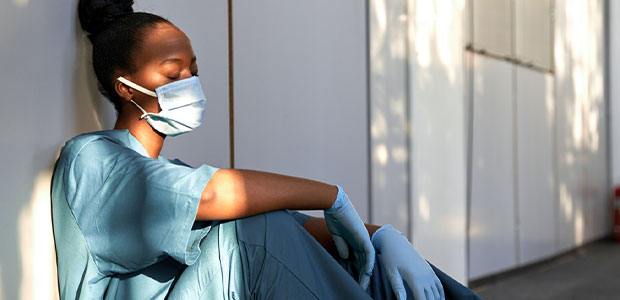
Another Pandemic Challenge for Nurses: Sleep Problems
Difficulty sleeping due to work stress and scheduling contributes to nurses’ anxiety and depression.
More than half of nurses had difficulty sleeping during the first six months of the COVID-19 pandemic and getting less sleep increased their odds of experiencing anxiety and depression, according to a new study led by researchers at NYU Rory Meyers College of Nursing.
“Nurses are already at risk for higher rates of depression and insufficient sleep compared to other professions, thanks to the stress of patient care and the nature of shift work. The pandemic seems to have further exacerbated these issues to the detriment of nurses’ well-being,” said Amy Witkoski Stimpfel, PhD, RN, assistant professor at NYU Rory Meyers College of Nursing and the lead author of the study, which was published in the Journal of Occupational and Environmental Medicine.
Nurses have faced unparalleled challenges working on the frontlines of the COVID-19 pandemic, including staffing shortages, an early lack of PPE and witnessing widespread suffering and death. Research is beginning to reveal the impact of these ongoing stressors on nurses’ mental health and well-being. In this study, the researchers surveyed 629 nurses and interviewed 34 nurses from June through August 2020. The nurses, who worked across healthcare settings in 18 states, were asked about their experiences working during the first six months of the pandemic in the U.S.
The survey revealed high rates of depression (22 percent), anxiety (52 percent) and insomnia (55 percent) among nurses. Notably, difficulty sleeping was both a contributing factor to and an outcome of poor mental health.
Only sleeping for five hours or less before a shift increased the odds of depression, anxiety and insomnia. However, nurses also described how anxiety and thinking about stressful working conditions—understaffing, being redeployed to a COVID unit, lack of PPE and many patient deaths—led to difficulty falling asleep and waking up at night. In addition to stress-related sleep problems, changes in nurses’ work schedules from either working extra hours or abruptly switching between day and night shifts led to nurses getting fewer hours of sleep.
“We found that sleep problems were interwoven with anxiety and depressive symptoms,” said Witkoski Stimpfel. “Prior research supports this bidirectional relationship between sleep and mental health. We know that getting sufficient sleep fosters mental and emotional resilience, while not getting enough sleep predisposes the brain to negative thinking and emotional vulnerability.”
To better support nurses and their well-being, the researchers urge employers to take action to address work stress and factors that influence sleep. In addition to making sure that nurses have the resources like staffing, beds, and PPE to effectively do their jobs, employers can offer training on stress management and provide referrals to mental healthcare professionals for those in need. Employers should also pay attention to scheduling, ensuring nurses have time away from work, protecting them from excessive overtime hours and shifts that quickly switch between day and night, and offering flexible working arrangements.
“Our findings help us better understand the difficulty nurses are facing—and why some nurses are leaving their jobs or the field altogether—but also reveal opportunities for hospitals and other employers to support this critical workforce,” said Witkoski Stimpfel.
Additional study authors include Lloyd Goldsamt and Victoria Vaughan Dickson of NYU Meyers and Lauren Ghazal of the University of Michigan. The research was supported by an NYU COVID-19 Research Catalyst grant.
This article was contributed by the NYU Rory Meyers College of Nursing.